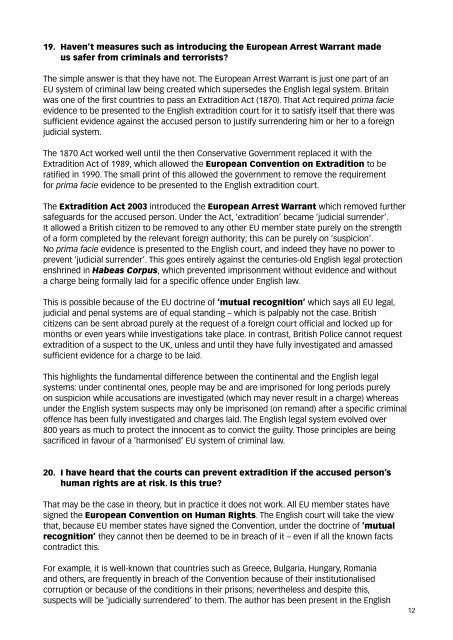EU Referendum FAQ v4
For those undecided in which way to vote in the EU referendum,this addresses the main questions and concerns people have
For those undecided in which way to vote in the EU referendum,this addresses the main questions and concerns people have
Create successful ePaper yourself
Turn your PDF publications into a flip-book with our unique Google optimized e-Paper software.
19. Haven’t measures such as introducing the European Arrest Warrant made<br />
us safer from criminals and terrorists?<br />
The simple answer is that they have not. The European Arrest Warrant is just one part of an<br />
<strong>EU</strong> system of criminal law being created which supersedes the English legal system. Britain<br />
was one of the first countries to pass an Extradition Act (1870). That Act required prima facie<br />
evidence to be presented to the English extradition court for it to satisfy itself that there was<br />
sufficient evidence against the accused person to justify surrendering him or her to a foreign<br />
judicial system.<br />
The 1870 Act worked well until the then Conservative Government replaced it with the<br />
Extradition Act of 1989, which allowed the European Convention on Extradition to be<br />
ratified in 1990. The small print of this allowed the government to remove the requirement<br />
for prima facie evidence to be presented to the English extradition court.<br />
The Extradition Act 2003 introduced the European Arrest Warrant which removed further<br />
safeguards for the accused person. Under the Act, ‘extradition’ became ‘judicial surrender’.<br />
It allowed a British citizen to be removed to any other <strong>EU</strong> member state purely on the strength<br />
of a form completed by the relevant foreign authority; this can be purely on ‘suspicion’.<br />
No prima facie evidence is presented to the English court, and indeed they have no power to<br />
prevent ‘judicial surrender’. This goes entirely against the centuries-old English legal protection<br />
enshrined in Habeas Corpus, which prevented imprisonment without evidence and without<br />
a charge being formally laid for a specific offence under English law.<br />
This is possible because of the <strong>EU</strong> doctrine of ‘mutual recognition’ which says all <strong>EU</strong> legal,<br />
judicial and penal systems are of equal standing – which is palpably not the case. British<br />
citizens can be sent abroad purely at the request of a foreign court official and locked up for<br />
months or even years while investigations take place. In contrast, British Police cannot request<br />
extradition of a suspect to the UK, unless and until they have fully investigated and amassed<br />
sufficient evidence for a charge to be laid.<br />
This highlights the fundamental difference between the continental and the English legal<br />
systems: under continental ones, people may be and are imprisoned for long periods purely<br />
on suspicion while accusations are investigated (which may never result in a charge) whereas<br />
under the English system suspects may only be imprisoned (on remand) after a specific criminal<br />
offence has been fully investigated and charges laid. The English legal system evolved over<br />
800 years as much to protect the innocent as to convict the guilty. Those principles are being<br />
sacrificed in favour of a ‘harmonised’ <strong>EU</strong> system of criminal law.<br />
20. I have heard that the courts can prevent extradition if the accused person’s<br />
human rights are at risk. Is this true?<br />
That may be the case in theory, but in practice it does not work. All <strong>EU</strong> member states have<br />
signed the European Convention on Human Rights. The English court will take the view<br />
that, because <strong>EU</strong> member states have signed the Convention, under the doctrine of ‘mutual<br />
recognition’ they cannot then be deemed to be in breach of it – even if all the known facts<br />
contradict this.<br />
For example, it is well-known that countries such as Greece, Bulgaria, Hungary, Romania<br />
and others, are frequently in breach of the Convention because of their institutionalised<br />
corruption or because of the conditions in their prisons; nevertheless and despite this,<br />
suspects will be ‘judicially surrendered’ to them. The author has been present in the English<br />
12







